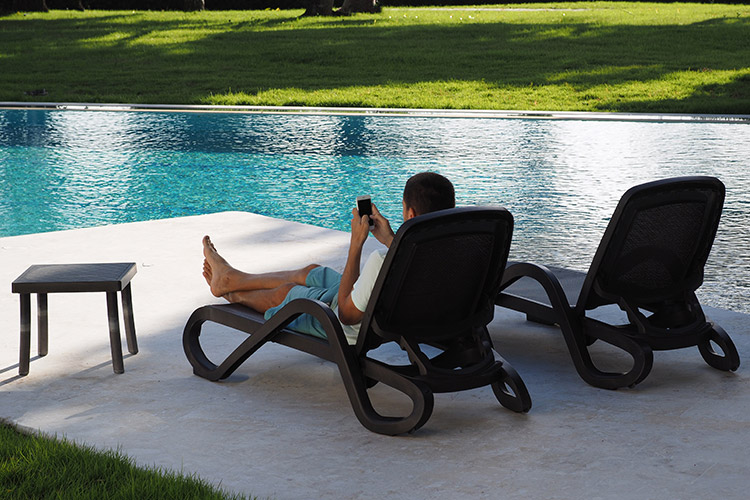How not to fall out with your partner on holiday…
Oh for a holiday ad that showed some of the more tricky aspects of being on holiday with your partner. Less of the running hand in hand on the sand into a dreamy sunset and more of the disagreements about when to leave for the airport, the different ideas about how to spend the time away and the disappointments of the reality that there is still washing up to do.
In my work as a couple therapist over the years I’ve heard a lot about holidays. I think they can put a real pressure on couples to have a good time and whilst it’s great when everything comes together and there are those sunset moments there are some issues that crop up again and again that we might think of as inevitable teething problems to being away and going on a break. In my new book Five Arguments All Couples (Need To) Have which is coming out on September 1st I look at some key areas that I see couples inevitably struggling with and I see them as potentially developmental for a couple. Here I’m going to look at some of these areas played out in the stage of going on holiday – issues like who does what, how we communicate, how we deal with phones, and managing relationships with each other’s families.
Getting to the airport
Even if couples or families aren’t flying, this idea of ‘getting somewhere at a particular time’ can stir up differences in a couple that need managing. One person’s idea of early or punctual may look very different from their partner’s idea. Add in the stress this year of the uncertainty around how long things will take at the airport and this is a potentially anxiety fuelled cocktail.
This may be something couples know well about each other having learnt about the different approaches over the years together or for newer couples this may be terrain they are starting to learn about each other. In our relationships we hold different roles and time-keeping can be one of the roles that there is a bit of a struggle to manage between us. When we argue about these issues it helps us to learn who is going to do what. It may be that a couple settle down into accepting that one of them is going to be the time-keeper or it may be that someone really doesn’t want to be saddled with that role. It’s inevitable that this is going to take some working out.
One thing that can be really helpful is to take some time before to think about the different feelings around. It’s easy to get preoccupied with packing but if a couple can take time -not even that much – to sit down and think about different concerns they have about going away then this can help foster a sense of being on the same page. The ‘airport’ may stand for more general anxieties about going away or travelling which could benefit from an airing in advance. If there’s a bit of reflection time together to think about the different ideas then this means couples are more likely to be able to come up with something creative to manage the situation.
Your way or my way?
This big old chestnut of couple relationships, ‘your way or my way?’ can get a fresh setting in which to play itself out when a couple are visiting somewhere new. As a couple orient themselves with a new place and all its unfamiliarities, anxieties can get stirred up about ‘how are we going to do things.’ There may be completely different ideas about what the holiday is for. Is it for relaxing or is it for adventure? Are we going to lie in or are we going to get up early to make the most of the day? (Not that you need a reason to get an ice cream on holiday, but this is a place where you don’t need to struggle with my way or you way. You can get to choose exactly what you want, however you want it, and no-one else gets to have an opinion…)
A conversation beforehand about different expectations can be helpful in this area. Where a couple disagree or have an argument about what to do or how to do it it may be after the event that a useful repairing conversation can take place to find out what is really going on. ‘What was that about? Why were you so cross about what we did today? Is there anything I’m missing?’ Sometimes, when we argue with our partners or disagree, there is a useful opportunity to learn something, if we can take time after the event to be curious about it.
Are you really going to sit on your phone all holiday?
On my recent break I went to the beach for the day and was struck by the different set ups of people on phones. Some couples doing stuff together, some where both were on their phones, some where one was on their phone while their family was around them getting on with other stuff. It made me think about this issue of phones and boundaries about phones that I think is so important for couples. What seems to me important is that there’s a dialogue about it so that it’s understood between the couple what the deal is. If one person is seething with resentment that their partner is on their phone all the time this needs tending to for the sake of the couple. I think there’s a lot of work involved to keep healthy boundaries around phones – more conversations than perhaps people bargain for. It also comes back to expectations in the couple about what the holiday is for. Is it for switching off from work and the outside world a bit, and putting phones away, or is it for doing what you want and reading stuff on your phone and switching off from the world immediately around you? A couple may have different ideas about this that need flagging up. Rather than disappearing off on a phone, leaving a partner wondering when they’re going to return, it may help if it’s signalled – I just need to spend x minutes looking at something. Sometimes being on holiday is hard, and tiring, particularly with young children, and it can be hard to face up to the feelings around that. Disappearing into a phone might be a way of dealing with that. When a couple can talk about that a bit with each other it can help set more creative conversations about how to have some time off family responsibilities, rather than trying to get the time off secretly which is bound to annoy the person who feels that they are left with the responsibilities.
I feel like I’m doing all the work here
The first time a couple go on holiday with a baby it can be a bit of a shock how different holidays are. Instead of lying back and doing nothing it can feel like more work than there is at home as they work at managing the new environment. The workload on holiday, whether it’s looking after children, cleaning up, cooking, shopping, washing up, can be a fertile area for resentments to build in a couple. Rows in this area are a sign that the workload needs addressing! This is such a big topic for couples that I cover in my chapter about Roles and I also look at why the arguments couples have intensify when they become parents.
Reality is disappointing sometimes. Maybe there were ideas that the holiday was going to be easy and without frustration and in fact it is a bit testy at times and there is still washing up to do. Sometimes these feelings of disappointment might find themselves taken out on each other in a couple but if they can get in touch with the more disappointed feelings together this can help shift them a bit – even turn them into something they can laugh about together.
Your family is driving me crazy
Sometimes holidays are an opportunity for extended family to hang out together. This can be wonderful and rich but can also raise tensions! I talk a lot about this issue of the in-laws in my book. It’s important to remember that your partner’s experience of your family is going to be very different from your own. What seems normal for someone from one family may feel strange to someone from another family. It can also be hard for the wider family to accept that a couple may be evolving their own way of doing things (particularly when it comes to children). Going patiently and respectfully with each other can help here and making a deal in advance to have some time out from the wider family where the feelings around it all can be talked about seems to help in these kinds of situations.
Top tips for holidays
- Speak in advance about different expectations for the holiday
- Make time to listen to each other’s concerns about the holiday
- Treat arguments as an opportunity to learn something important from each other
- Tend to the way you are using phones as an important bit of daily housekeeping
- Go easy on expectations if you’ve got young children or a young baby – having a good holiday is going to be a work in progress
- Deal with the in-laws as a couple, rather than thinking that it’s only a problem for the person who isn’t a member of the wider family
- Don’t under-estimate the capacity for alcohol to aggravate tensions
Five Arguments All Couples (Need To) Have and Why the Washing up Matters is published by Souvenir Press on 1st September 2022. You can preorder here.



